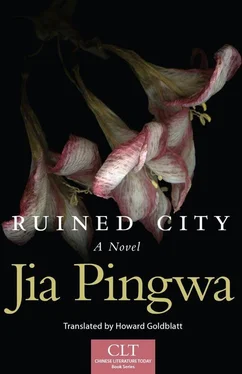Back home that night, he gave Wan’er an elaborate account of the conversation. She was so delighted by what she heard that she asked for more. The only way he could satisfy her curiosity was to spice up the story. “We’re in the middle of sex,” he said, “and you want me to talk to you about someone else. Are you trying to be a second Jing Xueyin?”
“I was fantasizing,” she said, “that I’m with Zhuang Zhidie!”
Zhou Min, deflated, stood there naked for several moments before reaching down and putting on his trousers.
As he’d hoped, Zhou Min received word from the editorial office to report for work. The news was like a rainsquall on parched summer land. He went in loaded down with gifts, which he handed out to everyone in the office. After that, he started each day early and did not get home until late. He performed all sorts of odd tasks: making trips to the printers, delivering manuscripts, mopping floors, bringing coworkers water, pleasing everyone, high and low. An intelligent man, he spent his spare time reading manuscripts, and gradually got the hang of how to write. One day he showed the editor-in-chief, Zhong Weixian, a story he had written, taking the man by surprise.
“You can write?” Zhong said. “Why didn’t anyone tell me?” Though the piece did not make it into print, Zhou’s hidden talents had been unearthed, and from then on, instead of going to the city wall to play his flute each morning and evening, he bought and read books by Zhuang Zhidie, ferreting out from people everything he could about the man, which he then took home, to the delight of Wan’er. Once, as she rolled out dough to make dumplings, her full breasts in rhythmic motion, she said, “If you really can write, why not do a piece about Mr. Zhuang? There are so many stories about him floating around Tongguan, and you know what he’s done in Xijing. You can try to get it published in the Xijing Gazette . Since a magazine’s circulation is tied to celebrities, you could get famous by writing about a famous man. Writing about him can only increase his influence, and when he learns that his name was responsible for your getting the job, if that pleases him, he’ll be grateful, and if it doesn’t, it can’t hurt you.” Thrilled and excited by her suggestion, he took the rolling pin from her. Not even stopping to let her wash her hands, he led her into the bedroom for some coupling.
Zhou Min turned Wan’er’s encouragement into a thirty-thousand-word article. Although he had yet to meet Zhuang Zhidie, a reader of the article might assume that he was one of Zhuang’s closest friends, someone with intimate knowledge of his life, his creative genius, and the many women who populated his personal and literary world. To be sure, the richest, most florid, and most detailed portions of the article were devoted to Zhuang’s relationship with Jing Xueyin, though she was not identified by name. Editor-in-Chief Zhong read the article with enthusiasm and decided to run it that month. As the date of publication neared, Zhou Min visited Meng Yunfang every day to ask if Zhuang had returned to the city. On one of those visits he learned from Xia Jie that Meng had gone with Abbot Zhixiang to the Temple of the Dharma Gate to view a Buddha relic. She informed him that Zhuang was back in town, and that he had phoned the night before. She wrote down his address and urged Zhou to pay him a call.
Zhou Min hailed a taxi and told the driver to take him to the headquarters of the Literary Federation on Beida Road. Halfway there, he told the driver to stop and let him out so he could walk the rest of the way to compose himself. When he got there, he saw a crowd at the gate and tensed up. Squatting down to rest, he stared at the simple metal gate, where a woman was carrying on a conversation and milking a Holstein cow into a porcelain mug.
A man shuffled out of the compound, stepping on the backs of his shoes. He was not tall, his hair was uncombed, and he was wearing a black T-shirt with yellow foreign words imprinted on both the front and back. The cow lowed loud and long.
“She’s calling for you,” someone in the crowd wisecracked.
“That’s because she’s afraid you people will drink all her milk. The woman brought her here for me, but you folks always drink first.”
“In the month since she last saw you, sir, I’ve hardly been able to get her to move. And there isn’t much milk. When we came to town today, she headed straight here, refusing to stop along the way, strangely enough, so I wondered if you’d returned. And here you are! But look how thin you’ve gotten!”
“What do you expect, with no milk to drink?”
“But you do have a paunch!” she said.
The man laughed and patted his prominent belly before lying down, taking one of the cow’s teats in his mouth and squeezing. Zhou Min found this hilarious: People in the Literary Federation sure are eccentric , he was thinking. It’s strange enough to drink milk before it’s pasteurized, but whoever heard of drinking it straight from the cow? He overheard people discussing the man’s paunch.
“Of course he’s got a paunch!” someone said. “Just ask him where he’s been.”
So she did: “Where have you been, feasting on delicacies? A line in a piece of doggerel goes, ‘An eighth class, propaganda shills, turn slogans and chants into cashable bills.’ Were you off at a meeting?”
“Look at his T-shirt,” said another. “In front it says ‘Hans Beer,’ and on the back it says ‘Beer Hans.’ There’s the source of the big belly.”
Pfft! The man lying under the cow exploded in laughter, spurting milk all over his face and neck. He stopped, handed the woman some money, stuck around long enough for a little banter, and shuffled back across the compound. She counted the money, saw that he’d overpaid her, and called out to return some of it.
One of the bystanders stopped her. “Maybe he drank more than you think,” he said. “Besides, it ought to cost more to take milk straight from the cow.”
“The other day,” she said, “on South Street, a young man said he wanted to try that. Not only did he fail to get a drop, the cow peed all over him.”
“He was lucky,” someone said. “If his aim had been a little off, he could have wound up sucking something else!” That created another explosion of laughter. This time the woman punched the man and led her cow away.
The crowd dispersed. Seeing that both the woman with the cow and her customers had left the scene, Zhou Min stood up, pulled himself together, and walked toward the compound, just as the scowling old gatekeeper came out to shut the gate. A bicyclist rode up and stopped.
“What do you want?” she asked.
“I’m looking for Wang An,” he said. “A lyricist who lives out back.”
“Who are you?” she asked.
“Are you checking IDs now?”
“What if I am?” was her ill-tempered response. “A country has its laws, a family its rules. I’m the gatekeeper, so watching the gate is my responsibility.”
“All right,” the man said, “all right. I work at the Giant Wild Goose Pagoda Cultural Center. My name is Liu, first name…”
“I don’t care what your first name is,” she said. “I’ll call him.” She went into the gatehouse and blew into a microphone. “Any sound?” she asked.
“Yes,” Zhou Min said, “there was.”
“Wang An Laoshi, you have a visitor,” she announced — twice, then a third time. The sound swirled around the compound. She stuck her head out. “He’s not in,” she said. “Come back another day.” Then she asked Zhou Min what he wanted. He was about to tell her that he wanted to see Zhuang Zhidie, but changed his mind. This old hag announces visitors like a whorehouse madam , he was thinking. If Zhuang actually came out to see his visitor, how would Zhou Min introduce himself? And could he make his intentions clear in a brief exchange at the compound gate? So he went back to Meng Yunfang’s home, arriving just as Meng was getting in. Meng offered to accompany him to the compound, but Zhou had a case of nerves. “Maybe it would be better,” he said, “to wait till the magazine hits the stands. It would make things easier if he had a chance to read the article first.”
Читать дальше


![Matthew Vincent - [you] Ruined It for Everyone!](/books/216429/matthew-vincent-you-ruined-it-for-everyone-thumb.webp)









